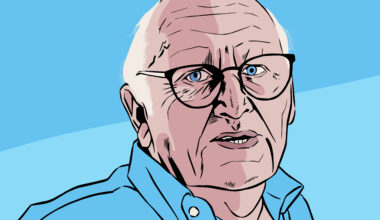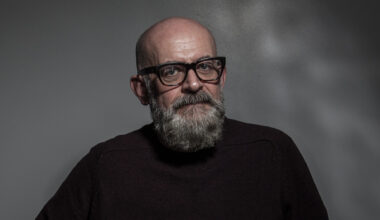Computer games, classical, crunchy techno and… Lucian Freud. Clark shares the influences that have contributed to his bristly electronic beats

Slice Of Life
“When I was 15 or 16, growing up in my hometown of St Albans, there were these really terrible psy-trance parties, and they were my first exposure to electronic music. I liked the fact it was electronic, but that was all I liked about it. Then I discovered actual techno. The Surgeon track ‘Muggerscum Out’ might have been one of the first I heard and it blew me away. It sounded like it was made of real things, in a way that acoustic music wasn’t. It was simultaneously less kitsch and more naturalistic than guitar music, because in the mid-to-late 90s guitar music was so churned out and formulaic that it almost sounded automated. This artificial music made on machines sounded like it was made out of pure earthly materials. It was so abrasive.
“I think if I heard ‘Muggerscum Out’ now I would like it as much as I did when I was 16. There are some tracks you can listen to all day that you don’t have to commit too much to, and they’re in the background, and there are some other tracks that you listen to once a year and fucking love. There’s a track of mine on ‘Turning Dragon’ called ‘Beg’, which is quite influenced by Surgeon. It’s not an everyday listen, it’s more a peak track. It’d be mental if you were constantly listening to it. It’s just there waiting, like an ultra hot chilli dip.”
Street Fighter II
“My obsession with music is weirdly connected to ‘Street Fighter II’ on the SNES when I was about 13. I think I became aware of muscle memory through playing it much more than through playing an instrument. If I play it now I’m still king at it, because I played it so much. I didn’t really enjoy music lessons at school, but I did enjoy ‘Street Fighter II’, it taught me more about music than music lessons ever did.
“I was obsessively recording drum machines and tapping on tables and working out rhythms at the time, so they’re interconnected somehow. I don’t know why I connect them, but it’s something about the repetition. I was always a fidgety little kid, and ‘Street Fighter II’ on the SNES takes me right back to when I first discovered drum machines. I don’t play computer games now – I’m nearly 40 and I don’t want to do that with my life – but that game is amazing.”
Ivory Power
“Claude Debussy’s ‘Danseuses De Delphes’ is one of my favourite pieces of music ever. It’s just about as perfect as you can get. It’s such a haunting track, and it makes you feel like you’re in another century. It’s so evocative, optimistic and weirdly oblique. He never quite gives you what you want with his music, it’s sort of obfuscated, and because of that it never loses its charm. It’s always slightly out of reach, and it doesn’t resolve in the way you expect it to, so it has this longevity. I never get tired of that song, and it’s only about three minutes long.
“I’m not so into his orchestral work. Most of the classical music I listen to isn’t orchestral, it’s just piano versions. I love hearing the purity of something stripped right down to one piano. I love Erik Satie too. I’m totally sick of the big, clichéd ones, but dig a bit deeper and some of his other stuff is amazing. There’s another guy, Frederic Mompou, a Spanish composer who’s really underrated. He’s a bit like Debussy, but he’s got that slightly uncanny, ethereal quality in his compositions. They’re more clunky, but they’re really appealing.”
Incredible String Band
“I’m definitely influenced by my contemporaries, such as Oliver Coates, who I did the ‘Bach Evolution’ performance at the Royal Albert Hall with in May. I haven’t known him long, but the RAH thing ended up being pretty funny and has slightly traumatised me, it’s such a weird sounding venue [laughs]. He’s just my favourite cellist ever. He’s got that thing where he inhabits the classical world, but makes these amazing, abrasive sonic sketches that have more in common with someone like Florian Hecker than they would have with your typical cellist.
“Olly is very open-minded, which is a rare quality in classical musicians. By design you’re part of this elite, and it’s actually quite sealed off from popular culture in some ways. He’s interested in electronics and his curiosity is really refreshing. He makes a real effort, and I love working with him.”
Batman
“I read somewhere recently that 80 per cent of all external input to the brain is from visual processing, but I don’t think that’s the case with me at all. It feels like 80 per cent is hearing and 20 per cent is sight, because I’m very clumsy. My ears are really focused, but I don’t think my eyes are, as I keep bumping into things. The whole visual language of Instagram and the internet baffles me. I’ve always sort of enjoyed music in its pure form. I really enjoy closing my eyes and listening to music.
“I like the idea of being able to close my eyes and think of sounds and make those sounds in the real world. Anything visual is a distraction. I mean, don’t get me wrong, I really love painting – Lucian Freud and Francis Bacon. It has to be really eye-catching for me to be into it, and then I’m really into it. I’m there, I’ve bought it… I haven’t bought any Lucian Freuds, obviously.
“Visual work needs to be really good to get my attention, whereas when I’m in the studio I know what I like, and I can amuse myself for hours on end with this concoction of effects pedals, synths, xylophones, cellos, drums, all of it. I feel there’s a certain laziness in that, and I need to give my visual cortex some more processing power.”
Clark’s ‘Kiri Variations’ is released by Throttle





